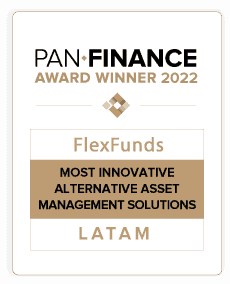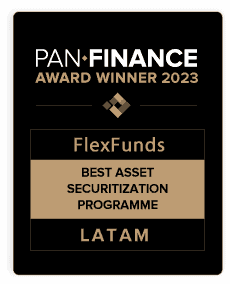- Global economic turbulence and shocks in the US financial system have echoed in private real estate capital funds.
- Investors are being cautious and closely evaluating monetary policies and macroeconomic factors before making new investments in these funds in the second semester.
- FlexFunds, a leading company in setting up and launching investment vehicles (ETPs), allows you to convert your fund into a listed security in a simple and agile manner, facilitating capital raising in international markets.
Private real estate capital funds have not been immune to the turbulence of the global economy amid a scenario of increasingly expensive access to credit, market volatility, and shocks in the US financial system resulting from the bankruptcy of some relevant players, which raised concerns in the first semester about a potential domino effect that was contained.
Due to the economic turbulence in the first semester of the year, investment advisors have acted cautiously throughout 2023. They are closely evaluating the evolution of monetary policies worldwide as the fight against inflation seems to be yielding the first results. The returns and performance of private real estate capital funds have been limited by these macroeconomic factors.
The uncertainty generated in this context by high-interest rates is causing a shift in strategy by investors in the world’s largest economies, which has impacted the flows of private real estate capital funds.
For example, in India, one of the most active emerging markets, private capital investment in the real estate sector plummeted by 20% in the first semester of the year, reaching $2.6 billion, which could have repercussions on the development of projects1, according to research firm Knight Frank.
Private real estate capital fund managers will be attentive in the second semester of the year to the monetary policy decisions of central banks in developed countries, the debt market, and the crisis in the US banking sector, which has caused disruptions in the real estate lending segment.
According to Knight Frank, regarding real estate assets, average price growth globally slowed down by 3.6% in twelve months until the first quarter of 2023. However, it warned that “this reversal alone does not suggest that global markets are going to improve since supply, limited construction of new homes, and strong household formation are acting to support prices in many markets.”2
For the British real estate services firm JLL, uncertainty about interest rates could begin to dissipate towards the end of the year as inflation shows further signs of decline. However, it projects that growth in the real estate sector will be moderate this year, although it believes it could exceed estimates made just three months ago.3
How do private real estate capital funds operate and generate returns in the market?
They are a type of alternative investment that provides exposure to a diverse basket of assets in the real estate sector, which are operated by professional managers through active strategies. These sorts of vehicles often offer diversification in investors’ portfolios but may require a larger capital injection to enter.
They operate through a collective investment scheme focused on acquiring and managing real estate. Generally, they are instruments targeted at high-net-worth investors, pension funds, and institutions.
The administrators of these funds are responsible for managing this portfolio, finding market opportunities, and making strategic decisions focused on achieving better returns.
In this sense, private real estate capital funds can be structured through an investment vehicle, and securitization of assets under an ETP structure is one of the most commonly used options as it offers greater ease in raising international capital.
The managers of these assets must take care of their administration, which involves maintenance, making improvements, and negotiating lease agreements, among others.
According to each investor’s share in the fund, a distribution of its benefits is made, either derived from rental income or the capital appreciation of the assets in case of an eventual sale.
The Canadian financial portal Investopedia indicates that4, although these instruments can yield up to 8%-10% annually, they also often face limitations in terms of liquidity and flexibility, so they are considered vehicles for specialized investors with a longer-term horizon.
In any case, it is essential for each investor to make decisions based on their risk profile and investment horizon, considering the pros and cons of this instrument and, if possible, seeking specialized advice to evaluate key points such as characteristics, fees, and commissions, regulations and prospectus, and fund ratings.
For investment advisors, managing these types of funds, who are interested in expanding the number of potential clients, securitizing the private capital fund can be an alternative. FlexFunds, a leading company in asset securitization, listing, and alternative investments, allows you to convert your fund into a listed exchange-traded product (ETP), facilitating international investor access to your investment strategy. Contact our financial experts to evaluate which solution best suits your needs.
Sources:
- https://www.cnbctv18.com/real-estate/private-equity-investment-in-real-estate-sector-declines-by-20–knight-frank-india-report-17081041.htm
- https://www.knightfrank.com/research/article/2023-07-05-growth-in-global-house-prices-falls-to-an-8year-low
- https://www.us.jll.com/en/trends-and-insights/research/global/gmp
- https://www.investopedia.com/terms/p/private-equity-real-estate.asp







